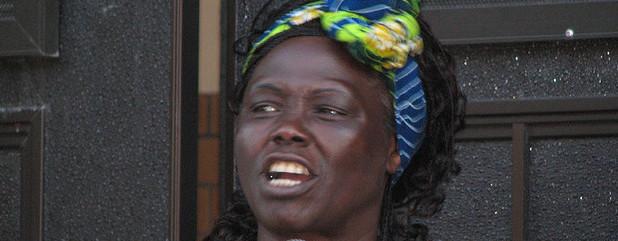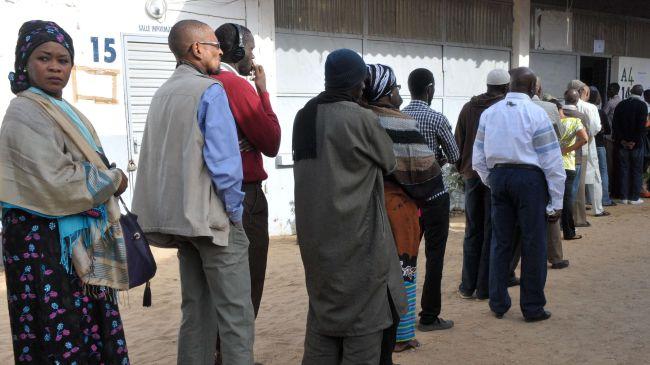Wangari Maathai was not a good woman. Kenya needs more of them.

That Kenya still doesn’t know what to do with the legacy of Wangari Maathai says more about a country at war with itself than it does about the activist hero.

Environmentalist, Nobel Prize winner and pro-democracy activist Wangari Maathai was the embodiment of the idea that “good women seldom make history”. Photograph by CNT.
25 September marked four years since the passing of Kenyan environmentalist and feminist icon, Wangari Maathai. Around the world, the anniversary was marked by speeches, tree planting ceremonies and any number of other events that resonated with Maathai’s legacy as a feminist, an environmentalist and one of the foremost leaders of the post-Cold War democracy movement.
In Kenya, however, the celebrations were notably muted – a handful of disjointed events by various individuals. A few days after the anniversary, the city council quietly announced that it was naming a road after Maathai to which many reacted with a figurative shrug. There was a poorly attended family fun day at the Karura Forest that Maathai sought to protect, and even though the event was free, few turned up. There wasn’t even a hint of recognition at the highest levels of government.
Yet this is Professor Wangari Maathai. The first African woman to win the Nobel Peace Prize. The first Kenyan woman to earn a doctoral degree. An icon of Kenya’s democratic movement who repeatedly put not just her mind but also her body on the line in order to secure a better future for Kenyans and their natural environment.
Maathai was a consistent thorn in the side of the autocratic administration of Daniel arap Moi which lasted over two decades up to 2002, and she revolutionised the act of protest in Kenya by centring it on the female body. In urging the protesting mothers of detainees to strip when threatened by security officers who were threatening to break up their protests, Maathai wove traditional beliefs on nudity and gender together with contemporary political struggles to foment a decisive moment in the struggle that brought women into the centre of a political discourse in which they had only previously been included peripherally. She was an intellectual and an activist who ultimately did more to spur on the democratic movement in Kenya than nearly anyone else.
It’s not that Maathai doesn’t have some kind of standing in Kenya. Most people recognise that she accomplished something. Her name will roll off the tongue if one is pushed to identify iconic women in the country. She stood up to the Moi administration and seemingly won at a time when most Kenyans believed it simply could not be done. Most Kenyans get that this is important.
But Maathai’s standing in Kenya is definitely ambiguous. She is beloved by feminists and environmentalists, and tolerated by everyone else, a fact that underscores the culture wars that pervade the Kenyan public sphere. The collision between traditions – mainly codified and preserved by outsiders through a stagnant colonial education and a pick-and-choose aspirational modernity that sees the value in keeping some traditions as long as they benefit power – has created many problems, particularly for women. Women are expected to look backwards on guidance on what it means to be “good” – where “good” is primarily defined by men – but not too good because that makes women less interesting to men.
The Madonna/Whore paradox is prevalent, and to navigate it many women live a Janus-faced existence that hides elements of their sexuality, their ambition or their personality from the male gaze. They are forced to pretend to be “good” to satisfy societal expectation and navigate the relatively small social and political space that remains.
But this was not Wangari Maathai. Maathai was brash and unapologetic. Her PhD was one thing, but she also divorced her husband at a time when divorce was still a major taboo and was roundly and publicly attacked for it. She insisted on leading from the front, rather than spectating while men battled for the soul of the country.
Because private morality is still so determinative of public standing, especially for women, most Kenyans still don’t know what to do with Maathai’s legacy. Kenya loves “good women”, but Maathai was not a “good woman”. Rather, she was an embodiment of the modern proverb “good women seldom make history”.
Even in death, Maathai’s legacy pays the price for this. For instance, every few months, Kenyan social media is seized by a paroxysm of misguided Moi nostalgia while by contrast Maathai’s anniversary barely registered. Parts of the forest she fought to save have been cleared for diplomatic missions and contested commercial development. Although she rose to the rank of Minister under the 2002 administration of Mwai Kibaki, she roundly lost in local elections in Tetu constituency in 2007 – a mere three years after she had won the Nobel Prize.
If an alien landed in Kenya this week they’d think Moi was a hero and Maathai a mere footnote in national history.
Maathai’s legacy is a victim of both the casual misogyny and the political schizophrenia that characterises Kenya’s public sphere. Like all other female politicians, when substantive policy critiques failed, her private life was laid bare for public consumption, particularly during her divorce. These stories would be replayed everywhere throughout her political career as a cautionary tale for women choosing to enter into politics – a reminder that only those with near virginal moral standing should be considered eligible to venture into mainstream politics. In Kenya, we want women to be strong and opinionated, but not too strong and not too opinionated – not like Maathai.
Kenyan politics will hold up women as emblems but denies them full participation in the highest levels of government, instead publicly referring to female politicians as “flower girls” and creating a political ghetto in the women’s representative positions that effectively wrote women out of mainstream politics. Maathai wanted to be more than an emblem, and Kenya still doesn’t know what to do with that.
Those who love her – primarily similarly insubordinate women who recognise the suffocating restrictiveness of the country’s political misogyny – do so passionately. Meanwhile, those who dislike her go beyond badmouthing her legacy to ignoring it completely, slowly and systematically writing her out of the democracy movement even though arguably it was her Mother’s Protest that set off the active phase of the pro-democracy demonstrations. Consequently, an entire generation is growing up that, worse than not liking Maathai, simply doesn’t know her.
Casual misogyny in the public sphere in Kenya can reach mind-boggling levels. We live in a time in which an MP is caught near red-handed in the act of rape and the country’s most popular comedian responds by questioning why she was with him. In which the president responds to the brutal sexual assault of a 4-year-old girl by her uncle and his friend by asking “where was her mother?” In which a national television station warns women who study beyond undergraduate level that they will never find a husband. In which women seen as being “indecently dressed” are violently stripped on the streets, with the vocal support of prominent public figures.
The situation in Kenya is such that US President Barack Obama can give a speech at the Kasarani National Stadium, observing at one point that “you cannot get ahead if half of your team isn’t playing”, and a journalist with a full spread in the most popular newspaper can say “I agree with everything Obama said, except that thing about women”. We live in a society in which silence around violence against girls and women is pervasive – 25% of women in all age groups have endured some kind of sexual and physical violence – and yet the first question victims of violence are asked is “what did you do to bring this upon yourself?”
Maathai’s legacy wrote against this toxic narrative. She was imperfect but somehow more effective for that fact, as she marshalled her imperfections as if to say “if I can do it, so can you”. She did more to give Kenyan women space to simply be themselves in the context of this casual misogyny and political schizophrenia than any woman of her generation merely by refusing to be a “good girl”.
That Kenya still doesn’t know what to do with this legacy says more about the country than it does about Wangari Maathai – a testament to a nation deeply at war with itself over what to do about women who refuse to be “good”.
Nanjala Nyabola is a Kenyan writer, humanitarian advocate and political analyst, currently based in Nairobi, Kenya.
–
If you enjoyed this, you may also enjoy:
Women’s rights violations don’t need to kill or maim to still be violations
Just when Kenya’s military needs more civilian oversight, a proposed bill calls for less






Wangari Maathai ‘comforted the afflicted in afflicting the comfortable’ and in her engaged public expressions of voice articulation Ms. Maathai was able to advance the intial conversation in that civic civil protest can assume different forms in expressive action. I suspect that the reason the Governing Elite in Kenya were dismayed profoundly in her actions can be attributed in that the Governing Elite did not know how to counter this voice save that of using ‘blunt’ instruments which rarely are effective in long term gestation. I am of the opinion that time and history will be with Ms. Maathai in that her voice will find expressive resonance in her acute prescriptive social insights. This woman will be remembered.
This “insubordinate woman” thanks you, from the bottom of her heart, for this profound piece of writing.
What a thought provoking piece of writing. So brilliant. Wangari mathaai’s legacy will live on wapende wasipende. I hope my granddaughters will live in a Kenya that treats its women (half of the team) like the productive members of society that they are. So help us God.
Yes,i agree.i dont know where we shall get another maathai who can be an example to the next generation.
Strong article, about a strong woman, written by a strong journalist! Thanks a lot for writing. I will pass it on, and I hope many people will read it.
Beautiful article btw. Your observation, sadly, is correct. The country seems to acknowledge that she was a great woman without actually thinking very carefully of how much she changed kenya and how she foresaw the problems of kenya even before we saw them. Some of us can’t see our problems still. Some just shrug and say that’s the way it’s supposed to be and move on to the next issue. Shame on us. We should be the generation that, with all this information, be able to make better decisions
Brilliant piece. Wangare Mathaai legacy will live on
Thank you so much. Please replace ALL the journalists we have in this country. Especially on that radio station with the popular comedian.
Brilliant piece. Wangari’s spirit will pave way for those of us who believe that we must…absolutely must stand out in our matriarchal splendour before patriarchy wipes us out.
Everyday…just living in this system makes the women die a little. We must start living. One love!
If all journalist and media personnel including myself will focus on the good of those who did bring real change to our country. She was a true heroine.
Interesting read. For such exemplary embodiments, the ‘very good’ bad girls must not let her legacy go into extinction, for the mere satisfaction of the political ‘bad boys’ and unfortunate misguided people; particularly, the younger generation.
To let go, will only deepen the dent of the country’s democracy , which is apparently still struggling to define itself.te
Interesting read. For such exemplary accomplishments of bravery and personal sacrifice displayed by the iconic Wangari, especially focusing on gender sensitive issues, which most dare dabble into, and in countries not too receptive of such ideologies; the ‘very good’ bad girls must not let her legacy go into extinction, for the satisfaction of the political ‘bad boys’ and unfortunate misguided people; particularly, the younger generation.
To let go, will only deepen the dent on the country’s democratic image , which is apparently still struggling to define itself.
Encouragement and support is what the women need from the men, so that together, transparent governance will yield greater results and respect for the country by other allies.
Brilliant analogy! Prof Maathai life is the epitome of what great leadership is and should be like. It is unfortunate that most Kenyans still don’t get the magnitude of her accomplishments even after all the international recognition. Like they say, a prophet is never welcomed at home, unfortunately. Her life’s work should be taught in every Primary School in Kenya or better still; High School & University so that every child & youth in this Country can learn about her life’s work. FYI, my nephew in the UK is learning about her life in year 4. It is a shame that this is not the case here. Her legacy will not fade because of people like you. Kudos to you for doing your #Littlething of reminding us about how important her legacy is to Kenya.
Lovely article the best I’ve read this year
Thank you for this amazing piece. I am ashamed of myself. As one who truly was in awe of Prof. Wangari even before her nobel prize, I ought to do more. I will sing it to my children at the very least. They must know of this great woman even as my country tries to ignore her.
A brilliant article and sadly very true. The best Kenya has done is to name a road. Sad
It is the norm that men are judged by their contribution to society while women are judged by their moral conduct. It is the way we found it.
Prof was a rare soul….despite all the good things she did in this country, its still hard to name even a park after her…while TZ president came just for three days visit and now we have Jakaya Kikwete Road…What has Kikwete done for this country? anyway that might be silly focus from me but I know, Prof Wangari was a rare Jewel…she delivered this country in her own way…despite the wrongs she was done by the past autocratic leadership, she could always afford a big smile….I will always be a humming bird, thats a virtue I have learned from you the late Icon!!!
Fantastic read! We have quite a long way to go as a country. Thanks for doing your ‘little thing’ of speaking up, Nanjala
Thanks for articulating the issue of some. so we’ll.
sadly the mis-representation of women in leadership is also evident in churches n its para church organisations.
prof Wangaris’ spirit lives on, the best we can do as women to commemorate her achievements
is to support each other.
what would happen if all women electorate supported fellow qualified women in politics.
#sisterhood
Very sad that well funded national nstitutions like kenya land commosion , kenya firestry ssrvice , kenya water towers etc gobling hundrds of millions of shillngs every yea have been unable to do what wangari did with bare hands…conssrve our natural forests
Thank you for a very illuminating piece on Prof Wangari Maathai. She was/is my SHERO!!!! She showed us how to be ‘bad women’!!! Indeed, I AM, unapologetically, a bad women!!! Prof Wangari showed us that women can/do play a major role in changing the world – if Kenyans are blind to it – the Nobel Peace Prize did it for her and us all!!!
Women in Kenya, more than anyone else, need to ensure her legacy lives on – because men will never ‘see’ what she did for the nation since she challenged so called ‘norms’. The-way-we-have-always-done-it; the-way-we-found-it and the-way-it-is syndrome will be changed by women who dare to break the rules set to keep them behind the bars of ‘moral conduct.’ When women define themselves by their contribution to change, others will learn the language soon enough: just like babies learn to speak – for many are babies when it comes to the language of women’s empowerment!!!
her place in history is curved and assured
Proffesor was God sent to enlighten her people But fortunately those meant to receive the message ignored the messager!!! Many years after we shall recall the great job she did to this country!! The great women who still are fighting on must take the courage of our great hero madam pro. Mathai.
Great
Very few people are like the icon Wangari Mathai. When she decided to safe Karura Forest and Uhuru park, she was doing it as her passion. The life of these vegetation of God could be no more, our lives could have been affected negatively. Why cant the government come up with a day to commemorate Wangari by Trees planting.
indeed she was a hero and my role model, but we need more of her character to change the world. To all women out there we should act fast and move on. God bless her work and may she rest in peace Amen.
This is, sadly, so true. The bit about the ‘good woman’ is a sentiment that almost causes a brain as one tries to uphold one’s ideals of fairness and justice while still battling the notions of ‘the woman’s place’ in society. Chimamanda also captures the same thing in the article ‘The Feminine Mistake.’
Well done.
chloroquinr https://chloroquineorigin.com/# how safe is hydroxychloroquine
cialis 20mg https://cialiswithdapoxetine.com/
cialis dosage https://cialiswithdapoxetine.com/
quinine vs chloroquine chloroquine us is hydroxychloroquine quinine